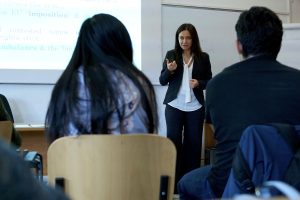Professor Silvia Scarpa Leads Service Learning Workshop
On Wednesday, November 15, 2017, the JCU Center for Professional and Continuing Education hosted a workshop titled “Human Rights and Gender Equality Trainings for Law Enforcement Authorities.” The workshop, part of the Service Learning project, was led by JCU Political Science Professor Silvia Scarpa, an expert on human rights, international law, international organizations, and migration.
Professor Scarpa shared her experience leading training sessions on human rights for the police forces of various countries. In her seminars, she encountered a number of challenges. The first issue was that often law enforcement authorities have no previous training on the concept and moral implications of human rights. Instead, police forces analyze a situation solely from a criminal perspective, usually within a victim-and-perpetrator framework.
The second issue Professor Scarpa encountered has to do with cultural differences, since her seminars had participants from all over the world, each with a distinct moral compass and set of values. Therefore, it was sometimes difficult for the participants to fully grasp concepts such as the moral necessity and legal obligations to respect and fulfill human rights or gender equality, or issues related to prohibition of the use of torture. Often, Scarpa said, ideas such as human rights are seen as western concepts imposed on the participants that – in the many trainings for peacekeepers she conducted – are usually from developing countries. Finally, the fact that international legislation on human rights was perceived to be “without teeth,” or not enforceable, was also problematic.
The third and final issue Professor Scarpa discussed was that of gender imbalance in law enforcement agencies. Regardless of the country, law enforcement agencies – and in particular military police forces – are still mostly male-dominated, with a mentality of “boys will be boys” with regards to workplace environment and behavior. This fact, Scarpa continued, exacerbates the difficulties of communicating the concepts of human rights and gender equality effectively.
To conclude the workshop, Professor Scarpa advanced a few suggestions to ensure the respect for human rights within police forces. She advocated for the use of simple concepts in law enforcement training, with the reliance on multiple training techniques (such as role-playing), and the use of case studies. Finally, she encouraged the development of operative recommendations, or the appropriate ways to behave in a certain situation to guarantee the respect for human rights and gender equality.
JCU Service Learning – Combining Fieldwork and Education – promotes co-curricular activities for students and graduates interested in working in the humanitarian field; it was conceived as a resource to prepare them for a life of civic engagement, enhancing their career development by connecting educational goals with service to those in need.






